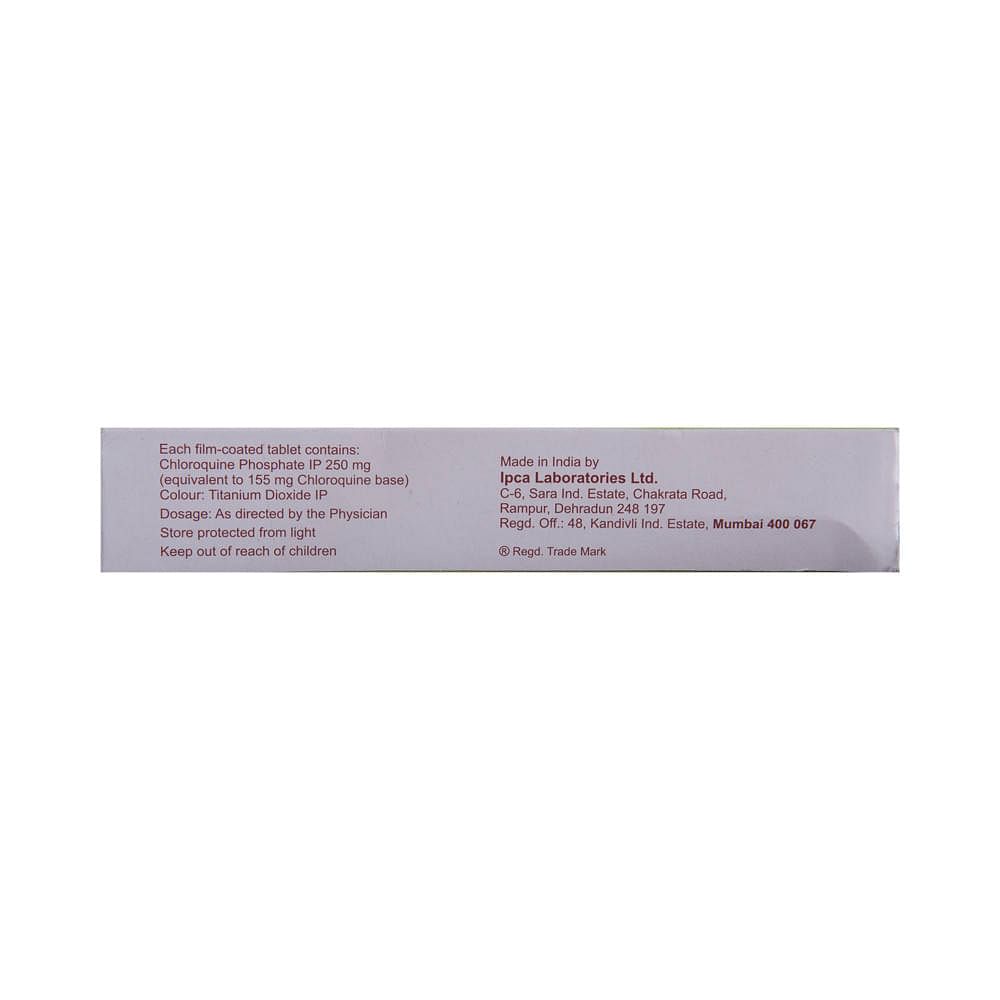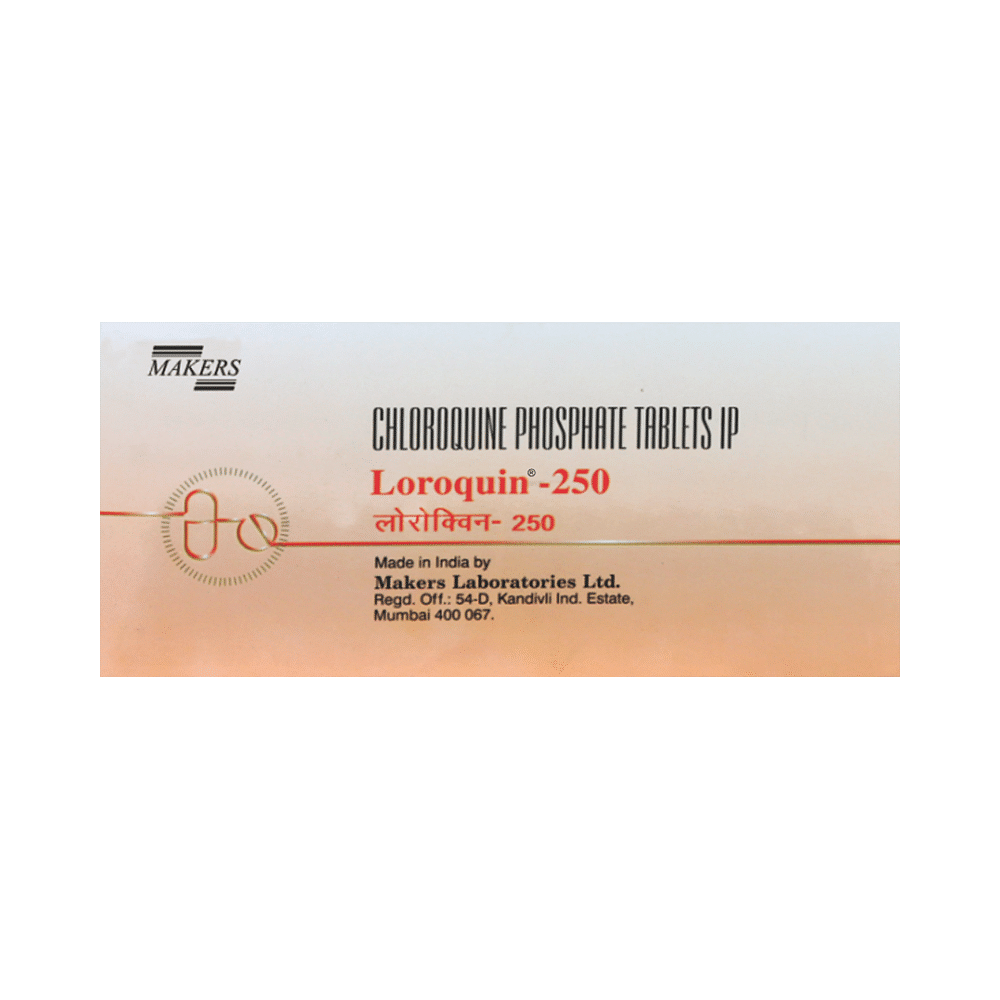
Nivaquine P 250mg Tablet
Manufacturer
Abbott
Salt Composition
Chloroquine (250mg)
Key Information
Short Description
Nivaquine P 250mg Tablet is an antiparasitic medicine used for the prevention and treatment of malaria.
Dosage Form
Tablet
Introduction
Nivaquine P 250mg Tablet should be used in the dose and duration as advised by your doctor. Take it with food to decrease the risk of stomach upset. Do not skip any doses and finish the full course of treatment even if you feel better. Stopping it early can result in treatment failure and increase the side effects too. Do not take a double dose to make up for a missed dose. Simply take the next dose as planned. Take measures to reduce the chance of being bitten by mosquitoes like using insect repellent creams on parts of your body not covered by clothing. Spray mosquito repellent to kill any mosquitoes that may have entered rooms in spite of screening. Wear light-colored and covered clothing when you are outside after sunset. Some people may experience rash, headache, dizziness, and vomiting as side effects of this medicine. It may also cause stomach pain, diarrhea, loss of appetite, and nausea. Please consult your doctor if these side effects persist for a longer duration.
Directions for Use
Take this medicine in the dose and duration as advised by your doctor. Swallow it as a whole. Do not chew, crush or break it. Nivaquine P 250mg Tablet is to be taken with food.
Safety Information
Side Effects
Rash Headache Dizziness Vomiting Stomach pain Diarrhea Loss of appetite Nausea
Alcohol Warning
It is not known whether it is safe to consume alcohol with Nivaquine P 250mg Tablet. Please consult your doctor.
Breastfeeding Warning
Nivaquine P 250mg Tablet is safe to use during breastfeeding. Human studies suggest that the drug does not pass into the breastmilk in a significant amount and is not harmful to the baby.
Pregnancy Warning
Nivaquine P 250mg Tablet may be unsafe to use during pregnancy. Although there are limited studies in humans, animal studies have shown harmful effects on the developing baby. Your doctor will weigh the benefits and any potential risks before prescribing it to you. Please consult your doctor.
Interacting Medicines
Leflunomide Mefloquine Penicillamine Digoxin
How it works
Nivaquine P 250mg Tablet is an antiparasitic medication that treats malaria. It works by increasing the levels of haeme in the blood, a substance toxic to the malarial parasite. This kills the parasite and stops the infection from spreading.
Quick Tips
Wear light-colored and covered clothing when you are outside after sunset Use insect repellent creams or sprays on parts of your body not covered by clothing Spray to kill any mosquitoes that may have entered rooms despite screening It may cause a blurring of vision when you first start taking it. Use caution while driving or doing anything that requires concentration Eye examination before and at 3–6 monthly intervals during use is required if patients are receiving Nivaquine P 250mg Tablet at continuous high doses for a longer duration
Related Medicines

Lariago Tablet

Idiquin 250mg Tablet

Loroquin 250 Tablet

Ceequine 250mg Tablet

Malarbin 250mg Tablet

Asoquine 250mg Tablet

Rosquin DS 250mg Tablet

Emquin 250mg Tablet

Neoquin 250mg Tablet

Anaquin 250mg Tablet
Frequently asked questions
What is Nivaquine P 250mg Tablet and what it is used for?
Nivaquine P 250mg Tablet is an anti-malarial medication that is prescribed for the treatment and prevention of malaria.
How long does it take for malaria symptoms to show?
Symptoms of malaria can develop as quickly as seven days after being bitten by an infected mosquito. The incubation period, meaning time between infection and symptom onset, typically ranges from seven to eighteen days.
Is it safe to use Nivaquine P 250mg Tablet for a long period of time?
If your doctor has prescribed you Nivaquine P 250mg Tablet for extended periods, regular eye checkups are crucial. This is because chloroquine in the medication can potentially cause blurred vision, difficulty reading (due to words disappearing), and a rare eye condition called retinopathy if taken over time.
Who should not use Nivaquine P 250mg Tablet?
Inform your doctor if you have psoriasis before taking Nivaquine P 250mg Tablet as it may worsen your condition.
What are the side effects of Nivaquine P 250mg Tablet?
Common side effects include stomach pain, nausea, vomiting, and headache. Taking this medication with food can often help reduce these side effects.
Can chloroquine cure coronavirus (COVID-19)?
There is not enough clinical data to prove that chloroquine is effective in treating COVID-19. Consulting with your doctor before taking this medication is crucial for proper guidance and treatment.
Can I take antacids along with Nivaquine P 250mg Tablet?
It's advisable to wait at least four hours between taking an antacid and Nivaquine P 250mg Tablet. This allows adequate time for absorption of the medication.
What is the difference between hydroxychloroquine and chloroquine?
Hydroxychloroquine and chloroquine were both first approved for malaria treatment. However, chloroquine typically causes more side effects than hydroxychloroquine. As a result, hydroxychloroquine is more commonly used today. Hydroxychloroquine is also approved for rheumatoid arthritis and lupus treatment, while chloroquine is not.
How can I prevent malaria?
Malaria prevention measures include covering exposed skin to deter mosquito bites, using a bed net when sleeping, and applying insect repellent containing DEET. Consult with your doctor about potential preventive medications if you are traveling to areas with risk of transmission.


